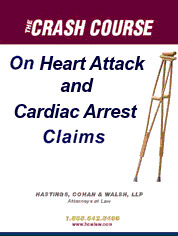Heart Attack Lawsuits
According to the American Heart Association, heart attacks kill one person every 1.7 seconds in the United States. It’s the number one killer in our country, and one of the most preventable causes of death. This is especially true of heart attacks in public places.
Heart Attack Emergency Response
People who become victims of heart attack (abnormal heartbeat) or sudden cardiac arrest (stopped heart) experience an “arresting” of the heart where the heart muscle becomes unable to pump blood to other areas of the body efficiently, depriving the cells of necessary oxygen.
The emergency response for a cardiac arrest involves the use of an automated external defibrillator, or AED. If an AED is applied properly within a few minutes of heart attack or sudden cardiac arrest, the heart can be shocked back into a normal rhythm and circulation restored. Without the application of an AED, there is little hope for survival.
Failure to Respond to Heart Attack
If an AED is not used within 3 – 5 minutes of a heart attack, the victim is at risk for permanent brain damage and death. In many cases, owners or managers of public places may be held accountable for negligence involving an AED when a visitor or patron dies or suffers severe complications after not receiving lifesaving AED treatment.
Attorney Richard Hastings works with attorneys around the country representing heart attack victims and their families whose deaths or complications from heart attacks in public places could have been prevented with an automated external defibrillator. If necessary these attorneys will file heart attack lawsuits to recover compensation for their clients.
Public Responsibility
Because the AED device has proven to be so successful in saving lives of heart attack victims, it has become standard to make AEDs available in certain public places. Today, there are AED state laws in place that make it mandatory for many different types of businesses and public locations to provide working AEDs in case of emergency. These locations must also have personnel on site who have been properly trained on how to use an AED effectively.
If a loved one suffered a debilitating or fatal heart attack in any of the following public places, your family may have a right to significant compensation:
- Fitness centers
- Golf courses
- Day cares
- Dentist offices
- Nursing homes
- State buildings
- Airports
- Sports arenas
- Schools
If you feel that a loved one’s death could have been prevented with an automated external defibrillator in a public place, you may be entitled to recover damages in a heart attack lawsuit. Please contact our heart attack attorneys for a free AED case evaluation.
